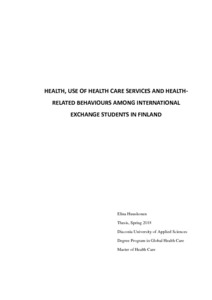Digitalization of health care to accelerate universal health coverage in Uganda
Jaaza, Paul (2025)
Jaaza, Paul
2025
All rights reserved. This publication is copyrighted. You may download, display and print it for Your own personal use. Commercial use is prohibited.
Julkaisun pysyvä osoite on
https://urn.fi/URN:NBN:fi:amk-2025061222666
https://urn.fi/URN:NBN:fi:amk-2025061222666
Tiivistelmä
This thesis investigates how digital health services can accelerate Uganda’s move closer to achieving Universal health coverage (UHC). The purpose of the study is to investigate how digitalization can accelerate Uganda’s progress towards achieving Universal Health Coverage (UHC). The objectives of the study were:1. To assess the status of digitalization of healthcare systems in Uganda. 2. To identify the key gaps in digitalization that hinder Uganda’s progress towards UHC. 3. To understand how Uganda’s digital health transformation aligns with global frameworks/guidelines.
The study is based on both global and regional frameworks including the WHO’s global digital health strategy and Uganda’s health information and digital health strategic plan. A qualitative research method was applied to this study which included semi-structured interviews with six participants from government, healthcare institutions and digital health implementors. Thematic analysis using method was applied to identify valuable patterns and perceptions from the data.
The finding indicated both positive developments and continuous challenges. Systems such as District health Information Software 2 (DHIS2), and mTrac, (a mobile software used to send data), have enhanced data management and disease surveillance, while private companies have expanded telemedicine services. However, infrastructure gaps, system fragmentation, restricted internet connection and shortage of workers continue to hinder digital health growth especially in rural areas and public health facilities.
The study concluded that digital health has enormous potential, but it requires more coordinated implementation, improved infrastructure, sustainable funding, and enhanced support for frontline health professionals. Uganda’s health future is dependent not only on technology but also on inclusiveness and well supported systems that meets the needs of all beneficiaries.
The study is based on both global and regional frameworks including the WHO’s global digital health strategy and Uganda’s health information and digital health strategic plan. A qualitative research method was applied to this study which included semi-structured interviews with six participants from government, healthcare institutions and digital health implementors. Thematic analysis using method was applied to identify valuable patterns and perceptions from the data.
The finding indicated both positive developments and continuous challenges. Systems such as District health Information Software 2 (DHIS2), and mTrac, (a mobile software used to send data), have enhanced data management and disease surveillance, while private companies have expanded telemedicine services. However, infrastructure gaps, system fragmentation, restricted internet connection and shortage of workers continue to hinder digital health growth especially in rural areas and public health facilities.
The study concluded that digital health has enormous potential, but it requires more coordinated implementation, improved infrastructure, sustainable funding, and enhanced support for frontline health professionals. Uganda’s health future is dependent not only on technology but also on inclusiveness and well supported systems that meets the needs of all beneficiaries.
Kokoelmat
Samankaltainen aineisto
Näytetään aineisto, joilla on samankaltaisia nimekkeitä, tekijöitä tai asiasanoja.
-
A literature Review on the Impact of eHealth Policies on the Quality of Health Care : Impact of eHealth Policies in Health Care: Perspective from developed and developing Countries
Okunhon, Itohan (Laurea-ammattikorkeakoulu, 2016)Abstract Background: It is an obvious and undisputable fact that there is high international interest in harnessing the potential of e-health possibilities in providing solutions and enhancing/ improving the quality and ... -
Health, use of health care services and health-related behaviours among international exchange students in Finland
Huuskonen, Elina (Diakonia-ammattikorkeakoulu, 2018)Background: As international student exchange grows more popular among University students globally, so does the need for studies regarding their health. More than 10,000 international exchange students come to Finland ... -
Improving health literacy among elderly : The impact of low health literacy on health and well-being of older individuals
Ahmed, Khadro (Yrkeshögskolan Arcada, 2015)Health Literacy is defined as the ability to understand, obtain and appraise health information in order to make appropriate decisions that can promote health. Low health literacy means lacking the ability to understand, ...



